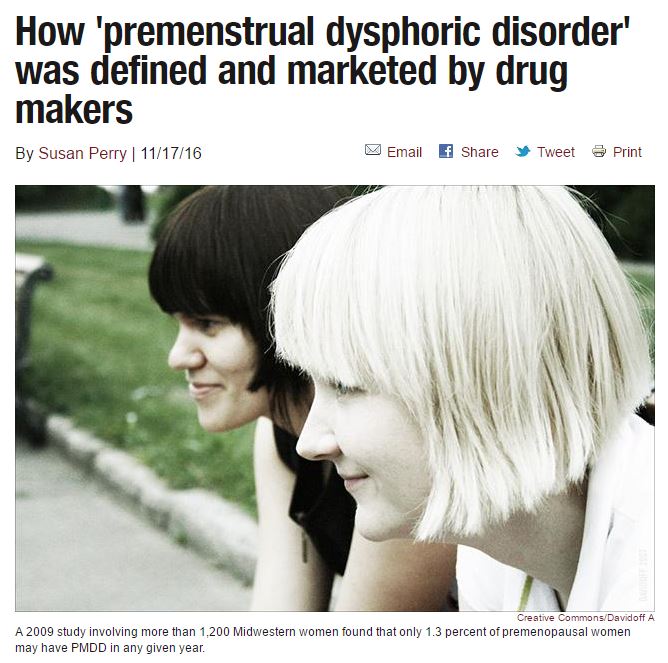For MinnPost, Susan Perry discusses that the pharmaceutical industry played in the creation of the ‘mental disorder’ known as premenstrual dysphoric disorder or PMDD. “What’s more, since Prozac was merely repackaged and renamed as a treatment for PMDD, she felt it would make it easier for family practice doctors and gynecologists to prescribe it without doing the kind of psychological assessment that was needed to rule out other mental problems. Another concern was that having it in the diagnostic manual could help mask what otherwise might be a woman’s justified reaction to abuse and mistreatment.”
-
I won’t dispute the assertion that Eli Lilly and a team of researchers played a big role in PMDDs addition to the DSM, but I would caution against drawing erroneous conclusions from that set of events.
PMDD almost killed me. My PMDD was cured by a hysterectomy and bilateral oophorectomy. After winning my battle against PMDD I found a vast community of women who have and do struggle with the disorder. The issue that women with PMDD come up against, time and time again, is that when they walk into a physician’s office and complain of mood symptoms that correlate with their menstrual cycles, no credence is given to the women’s reports.
So rather than women with ‘ordinary’ depression, “getting lumped into a diagnosis of PMDD,” as Nada Scotland fears, women with PMDD are getting diagnosed with major depressive disorder, bipolar disorder, or borderline personality disorder. The latter two diagnoses reflect the cyclical nature of PMDD or the appearance of emotional lability due to the cyclical nature of PMDD. The differential diagnosis that should be happening isn’t happening, but it doesn’t err on the side of excessive PMDD diagnoses.
The result is the same. The women with PMDD who report that their mood challenges have a hormonal basis and a clear correlation with their period are ignored. But they are still plied with SSRIs, which do not have any long term effect against the psychological manifestations of PMDD. PMDD only responds to hormone agonists like Lupron, or surgical correction, such as I had.
The core issue is that PMDD is an endocrine disorder, and as such should not be treated by psychiatrists. Since it is a health issue that exclusively affects women, PMDD is under researched. Perhaps a solution short of a surgery will treat it in the future, but to date, SSRIs are not the solution, and Ely Lilly’s role in the relegation of the disorder into the diagnosis manual of psychiatrists is a big step in the wrong direction.















